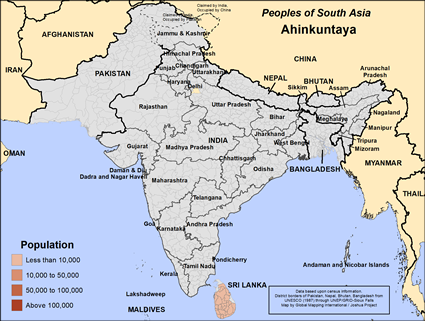The Ahinkuntaya people of Sri Lanka speak Sinhala, the language of the Sinhalese majority. Historically, they belong to a caste traditionally associated with washer work and laundry services, a role that was essential in village life and temple rituals. Their name is linked to their occupational heritage, which served both domestic and ceremonial needs in Buddhist society. Over centuries, the Ahinkuntaya remained a small but distinct community within the Sinhalese social hierarchy. Colonial modernization and urbanization weakened caste-based restrictions, yet cultural identity tied to traditional occupations persists in rural areas. Many Ahinkuntaya families live in provinces such as Southern, Western, and Central Sri Lanka, where they maintain a mix of traditional and modern livelihoods.
Traditionally, Ahinkuntaya families earned their living by washing clothes for households and temples, a service that gave them a unique place in Sinhalese society. While some continue this work, economic pressures and modernization have pushed many into wage labor, agriculture, and urban employment. Education has opened doors for younger generations, but rural communities still face limited opportunities and seasonal income instability. Social mobility is constrained by lingering caste prejudice, which influences marriage and community interactions.
Ahinkuntaya are predominantly Theravada Buddhists, deeply integrated into the Sinhalese Buddhist cultural framework. Their spiritual life revolves around temple worship, observance of Buddhist festivals, and merit-making rituals. Folk practices often accompany orthodox Buddhism, including offerings to deities and participation in ceremonies that blend animistic elements with Buddhist traditions.
Buddhism shapes their worldview, and there is some exposure to the gospel, but evangelical presence among them is minimal. This leaves a significant need for workers who can share Christ's love and truth, offering hope for this life and the life to come.
Access to quality education and vocational training is essential for breaking cycles of poverty and enabling sustainable livelihoods. Healthcare and nutrition are critical needs in rural areas where resources are scarce. Spiritually, the Ahinkuntaya need freedom from ritual-based religion and the life-transforming message of the gospel. Without intentional discipleship, cultural Buddhism will continue to dominate, leaving hearts unreached by Christ's grace. Emerging Christian communities require strong leadership development to grow in faith and join the global mission movement.
Pray for God's provision of education, jobs, and healthcare for Ahinkuntaya families.
Ask the Lord to send faithful workers who will share the gospel and disciple new believers among the Ahinkuntaya.
Intercede for spiritual breakthrough, that cultural Buddhism would give way to vibrant faith in Christ and active participation in His mission.
Pray for unity and courage among Ahinkuntaya Christians, that they would overcome social barriers and become bold witnesses in their communities.
Scripture Prayers for the Ahinkuntaya in Sri Lanka.
Caste System in Sri Lanka – Wikipedia
Religious Beliefs in Sri Lanka – WorldAtlas
Caste Discrimination and Social Justice in Sri Lanka – IIDS Working Paper
Lifestyle Changes During the Economic Crisis – Journal of Public Health
| Profile Source: Joshua Project |











